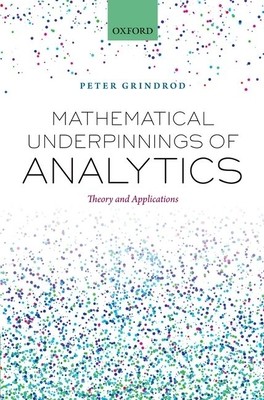
- We will send in 10–14 business days.
- Author: Peter Grindrod
- Publisher: Academic
- ISBN-10: 0198725094
- ISBN-13: 9780198725091
- Format: 15.8 x 23.4 x 2.3 cm, kieti viršeliai
- Language: English
- SAVE -10% with code: EXTRA
Reviews
Description
Analytics is the application of mathematical and statistical concepts to large data sets so as to distil insights that offer the owner some options for action and competitive advantage or value. This makes it the most desirable and valuable part of big data science. Driven by the increased data capture from digital platforms, commercial fields are becoming data rich and analytics is growing in many sectors. This book presents analytics within a framework of mathematical theory and concepts building upon firm theory and foundations of probability theory, graphs and networks, random matrices, linear algebra, optimization, forecasting, discrete dynamical systems, and more. Following on from the theoretical considerations, applications are given to data from commercially relevant interests: supermarket baskets; loyalty cards; mobile phone call records; smart meters; 'omic' data; sales promotions; social media; and microblogging. Each chapter tackles a topic in analytics: social networks and digital marketing; forecasting; clustering and segmentation; inverse problems; Markov models of behavioural changes; multiple hypothesis testing and decision-making; and so on. Chapters start with background mathematical theory explained with a strong narrative and then give way to practical considerations and then to exemplar applications. Exercises (and solutions), external data resources, and suggestions for project work are given. The book includes an appendix giving a crash course in Bayesian reasoning, for both ease and completeness.
EXTRA 10 % discount with code: EXTRA
The promotion ends in 22d.09:48:40
The discount code is valid when purchasing from 10 €. Discounts do not stack.
- Author: Peter Grindrod
- Publisher: Academic
- ISBN-10: 0198725094
- ISBN-13: 9780198725091
- Format: 15.8 x 23.4 x 2.3 cm, kieti viršeliai
- Language: English English
Analytics is the application of mathematical and statistical concepts to large data sets so as to distil insights that offer the owner some options for action and competitive advantage or value. This makes it the most desirable and valuable part of big data science. Driven by the increased data capture from digital platforms, commercial fields are becoming data rich and analytics is growing in many sectors. This book presents analytics within a framework of mathematical theory and concepts building upon firm theory and foundations of probability theory, graphs and networks, random matrices, linear algebra, optimization, forecasting, discrete dynamical systems, and more. Following on from the theoretical considerations, applications are given to data from commercially relevant interests: supermarket baskets; loyalty cards; mobile phone call records; smart meters; 'omic' data; sales promotions; social media; and microblogging. Each chapter tackles a topic in analytics: social networks and digital marketing; forecasting; clustering and segmentation; inverse problems; Markov models of behavioural changes; multiple hypothesis testing and decision-making; and so on. Chapters start with background mathematical theory explained with a strong narrative and then give way to practical considerations and then to exemplar applications. Exercises (and solutions), external data resources, and suggestions for project work are given. The book includes an appendix giving a crash course in Bayesian reasoning, for both ease and completeness.


Reviews